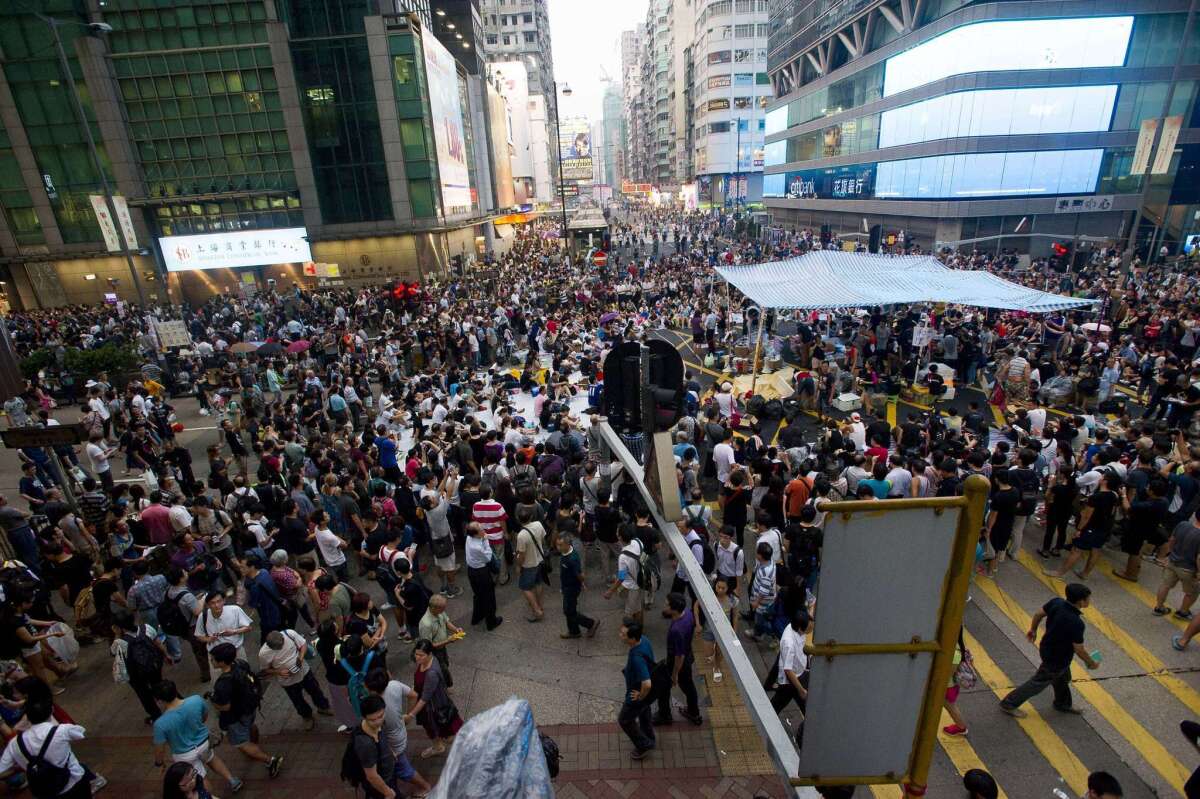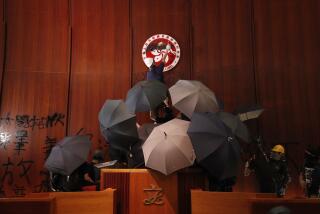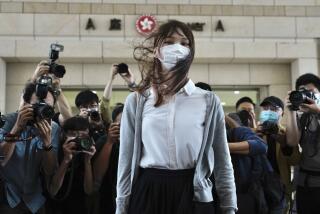Hong Kong shopping district becomes political protest haven

Among the neighborhoods of Hong Kong where pro-democracy protesters have been amassing is Mong Kok, better known as a shoppers’ haven than a site for political organizing.
Since Monday, the district of open-air markets and sleek malls, one of the oldest in Hong Kong, has become one big civic forum. When protesters occupied major intersections, shops shuttered. In a city where shopping usually seems to be the favorite pastime, protesters now are united in their demand for free and fair elections.
The protests were sparked by rules imposed by mainland Chinese authorities that would limit voters’ choices in Hong Kong’s 2017 election for chief executive, the territory’s top official. As police used tear gas Sunday to disperse protesters in the city’s central and government district, many flocked instead to this popular neighborhood.
Just a stone’s throw from noodle stands and nightclubs, dense circles of protesters sit on the ground listening to impromptu speeches by anyone willing to voice their views and ideas.
“We’re not anti-Chinese Communist Party, but we need to exercise our right to decide our future,” said Jay Fung, 40. Fung then talked about why he thought the election rules set down by Beijing are objectionable.
Some speakers are more personal than political.
“When I smelled the tear gas, at first I was very afraid, but later I was no longer afraid,” said James Chan, 55, choking back stage fright and tears. “because we’re fighting for our kids.”
His talk drew cheers from the crowd of more than 100 people. “Brave Dad,” one shouted.
However, what appeared to be a free-form civic forum in fact required coordination and discipline to avoid arguments and cool flaring tempers.
When starting a new forum, Angie Tse, 40, said she would sit close to the center to attract more participants. If someone wouldn’t stop picking arguments or interrupting the speaker, the forum would move to another spot to adhere to the non-violent, non-confrontational principle, and give police no excuse to break up the protest.
On Tuesday night, after 12 hours at the sit-in, Tse waited for her brother to take her place. “Everyone must come out for this,” Tse said. The next night, she said, there’d be no need for her to run home. “I’ll bring a sleeping bag.”
Intermittent bursts of Cantonese protest songs and punk rock were the soundtrack of the four-block sit-in area. However, a “No Party” sign was posted to remind everyone that the fight is not play.
The centerpiece of the protest zone is a stranded double-decker bus plastered with handwritten notes, some leavened with humor and other steeped in passion:
“Don’t throw gas at us. We can cry by ourselves.”
“I love you, Hong Kong. I won’t give up.”
The most prevalent portrait posted around was that of Sun Yat-sen, founder of modern China. Sun, who attended medical school in Hong Kong, was widely revered here as a homegrown revolutionary.
The bus stop area now hosts a column of motorcycles. A dozen motorcycle club members serve as couriers, ferrying supplies to various protest across the city.
After giving what he said was his first public speech, Chan, who lives in the neighborhood, planned to stay out all night. He also brought his 17-year-old daughter, saying, “This is very good civic education for her.”
Law is a special correspondent.
More to Read
Start your day right
Sign up for Essential California for news, features and recommendations from the L.A. Times and beyond in your inbox six days a week.
You may occasionally receive promotional content from the Los Angeles Times.






